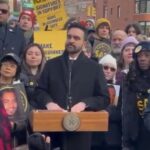
President Trump is wasting no time spiking the football, especially after seeing footage of Venezuelan dictator, Nicolas Maduro, mocking those he considers less than brave.
As The Gateway Pundit reported earlier, a series of explosions rocked Caracas and other cities in Venezuela, signaling the start of the US campaign against Maduro’s evil Marxist regime.
Low-flying aircraft could be heard, as well as air raid sirens. Bright flashes could be seen in at least six locations, including Fort Tiuna army base and La Carlota Air Base, where power outages hit some neighborhoods.
U.S. forces captured Maduro and his wife, Cilia Flores, during the raid. As TGP’s Jordan Conradson reported, both have been indicted in the Southern District of New York.
Trump piled on this afternoon by posting a video savagely trolling the Venezuelan tyrant.
Back in August, viral video footage emerged allegedly showing Maduro taunting someone and calling him a coward. This has since resurfaced following today’s events.
“Come for me. I’ll be waiting here in Miraflores,” Maduro is heard saying. “Don’t take too long, cowards.”
Trump shared the video of Maduro saying this on Truth Social, with AC/DC’s famous song “Thunderstruck” playing in the background during Trump’s video.
The footage then switches to a bald eagle glaring while a voice in the background says, “I have three things to say: God bless our troops, God bless America, and Gentlemen start your engines!”
The video concludes with footage of this morning’s bombing raid on Venezuela.
WATCH:
Yahoo reported the video footage of Maduro’s speech is actually from July 30, 2024. The outlet says Maduro was actually calling his 2024 election opponent Edmundo González Urrutia a coward for questioning the fraudulent results.
X users immediately started hailing the video as one of the most incredible things Trump has ever posted.
BOOM! This is the most BAD*SS thing President Trump has posted in a long time!
MADURO: “Come for me! Don’t wait too long, COWARD!”
TRUMP:
Boom.
I so voted for this. pic.twitter.com/kqdjXeS4qh
— Eric Daugherty (@EricLDaugh) January 3, 2026
HOLY CRAP! This might just be the most EPIC Trump post of all time
Trump posted a video of Maduro CHALLENGING 47 to “come get me,” followed up by a screaming Bald Eagle & Thunderstruck blaring in the background during missile fire
Trump said “challenge accepted” pic.twitter.com/3IPKUnGRtM
— Nick Sortor (@nicksortor) January 3, 2026
Trump is showing levels of Alpha male energy not seen since Caesar.
— Bitcoin Rosary ✝️⚡️ (@BitcoinRosary) January 3, 2026
Maduro’s singing a different tune now: pic.twitter.com/YcjDgTQ84n
— Socialism Creates Suffering (@TwoAForever) January 3, 2026
Cinema pic.twitter.com/z1jk0OBCx7
— JaaackWeezy (@Weeezy_J) January 3, 2026



